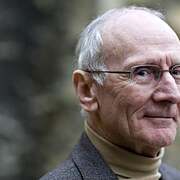John Carey (1) (1934–)
Author of Eyewitness to History
For other authors named John Carey, see the disambiguation page.
About the Author
John Carey is Merton Professor of English at Oxford University. A distinguished critic, reviewer, & broadcaster, he is the author of several books, including "The Intellectuals & the Masses". (Bowker Author Biography)
Image credit: Photograph: David Levenson/Getty Images
Works by John Carey
The Intellectuals and the Masses: Pride and Prejudice Among the Literary Intelligentsia, 1880-1939 (1992) 341 copies, 4 reviews
Associated Works
Vanity Fair (1877) — Editor, some editions; Introduction, some editions — 15,008 copies, 192 reviews
The Pleasure of Reading: 43 Writers on the Discovery of Reading and the Books that Inspired Them (2015) — Contributor — 88 copies, 2 reviews
The Cambridge Companion to Apocalyptic Literature (Cambridge Companions to Religion) (2020) — Contributor — 17 copies
Tagged
Common Knowledge
- Birthdate
- 1934-04-05
- Gender
- male
- Nationality
- UK
- Country (for map)
- UK
- Birthplace
- Barnes, London, England, UK
- Places of residence
- London, England, UK
- Education
- Oxford University (St. John's College)
Richmond and East Sheen Boys’ Grammar School - Occupations
- professor (Emeritus Merton Professor of English Literature ∙ St. John's College ∙ Oxford ∙ 1975-2001)
literary critic
Members
Reviews
Lists
Awards
You May Also Like
Associated Authors
Statistics
- Works
- 25
- Also by
- 9
- Members
- 3,548
- Popularity
- #7,156
- Rating
- 3.8
- Reviews
- 38
- ISBNs
- 163
- Languages
- 7
- Favorited
- 2



















Of course we get all the “big moments” — Galileo, Newton, Mendeleev, Darwin, Mme Curie, Einstein and so on — and we get pieces by most of the well-known “popularisers” (Gould, Dawkins, Feynman, etc.) but he also picks out some less obvious moments of discovery, and salts the mixture of science writing by scientists with a few teasing bits of science from poets and novelists. We probably know about Steinbeck’s marine biology and Nabokov’s butterflies, but what about George Orwell on toads, or Ted Hughes on cosmology?
Fittingly, the book finishes with Asimov’s chilling piece about the limits of world population, written half a century ago and truer (and scarier) than ever.
It’s a great book for anyone to dip into and will probably send you off down a few rabbit holes that are new to you, whatever your background, but I should think it would also be a very good choice if you need something to give to a non-scientific friend to help them understand what science is really about (besides wearing white coats and destroying the world, of course…).… (more)